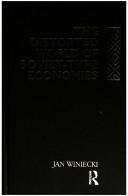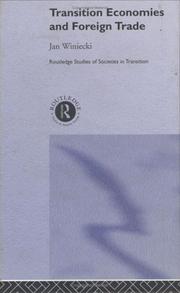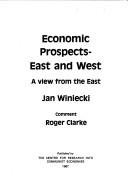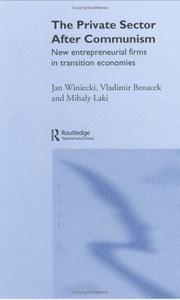| Listing 1 - 5 of 5 |
Sort by
|

ISBN: 0415003903 Year: 1988 Publisher: London Routledge
Abstract | Keywords | Export | Availability | Bookmark
 Loading...
Loading...Choose an application
- Reference Manager
- EndNote
- RefWorks (Direct export to RefWorks)

ISBN: 020327864X 0415253349 0203164598 1134526024 1280068787 0429228902 9780203164594 9780415253345 9786610068784 661006878X 9780429228902 9781134526024 9781280068782 9781134525973 9781134526017 1134526016 Year: 2002 Publisher: London ; New York : Routledge,
Abstract | Keywords | Export | Availability | Bookmark
 Loading...
Loading...Choose an application
- Reference Manager
- EndNote
- RefWorks (Direct export to RefWorks)
Transition Economies and Foreign Trade makes the bold claim to have solved puzzles that have hindered the subject for years. By taking the distortions of the Communist era into consideration, Winiecki has explained the phenomenon of the decline in output and trade, as well as explaining the dual commodity nature of exports in the early transition phase.The book's intriguing analyses include:*the legacy of the Communist past upon foreign trade transition*the reorientation of exports from the East to the West *trade and exchange rate regimes and their impact upon foreign
Exports. --- Commerce --- Business & Economics --- Local Commerce --- Exports --- International trade. --- Europe, Eastern --- Europe, Central --- Commerce. --- Economic conditions --- Economic conditions. --- External trade --- Foreign commerce --- Foreign trade --- Global commerce --- Global trade --- Trade, International --- World trade --- Central Europe --- International trade --- International economic relations --- Non-traded goods
Book
ISBN: 9789633861448 9633861446 9633860636 9789633860632 9789633860625 Year: 2016 Publisher: Budapest, Hungary ; New York, New York : Central European University Press,
Abstract | Keywords | Export | Availability | Bookmark
 Loading...
Loading...Choose an application
- Reference Manager
- EndNote
- RefWorks (Direct export to RefWorks)
Alternative strategies of economic development have received little attention in the literature. Academics rarely compare certain strategic features or assess the performance of different strategies in terms of outcomes. This book seeks to address that gap and to provide a theoretical background to the shift from industry to human capital-intensive services as the engine of economic growth. Pioneering studies reveal interesting trends and patterns that point to the growing importance of intangible capital for the level of GDP. They also indicate a much greater role of economic freedom in bringing about this second great structural change than was the case with industrialization. With this perspective on structural change and the role of freedom, Shortcut or Piecemeal also provides an extensive assessment of four key developing countries: Brazil, Russia, India, and China. Subjects: 1. Central planning—History. 2. Economic development—History
E-books --- Economic development --- Central planning --- History --- Central economic planning --- Centrally planned economy --- Economic planning --- National planning --- State planning --- Economic policy --- Planning --- History. --- Brazil, China, Economic development, Economic growth, History, India, Political economy, Russia.

ISBN: 0948027061 Year: 1987 Publisher: London Centre for Research into Communist Economies
Abstract | Keywords | Export | Availability | Bookmark
 Loading...
Loading...Choose an application
- Reference Manager
- EndNote
- RefWorks (Direct export to RefWorks)

ISBN: 0415318076 0415651050 0203601653 1134368666 1280056584 0203506901 9780203506905 9780415318075 9786610056583 6610056587 9781134368617 9781134368655 9781134368662 9780415651059 1134368658 9780203601655 9781280056581 Year: 2004 Publisher: London ; New York : Routledge,
Abstract | Keywords | Export | Availability | Bookmark
 Loading...
Loading...Choose an application
- Reference Manager
- EndNote
- RefWorks (Direct export to RefWorks)
The transformation of state-owned enterprises into privately owned ones is commonly referred to as 'privatization'. Just as important as this process, though sometimes not given the attention it deserves and requires, is the establishment and expansion of new private firms.This book analyzes new entrepreneurial firms that emerge and occasionally flourish after a period of state communism has come to an end. The authors rightly focus on the aftermath of the end of communism by looking first at the inevitable output decline, followed by an overview of new entrepreneurial firms. Specific East
Economic order --- Firms and enterprises --- Eastern and Central Europe --- Privatization --- New business enterprises --- Former communist countries --- Europe, Eastern --- Economic policy. --- Economic policy --- Business starts --- Development stage enterprises --- How to start a business --- New companies --- Start-up business enterprises --- Start-up companies --- Start-ups (Business enterprises) --- Starting a business --- Startups (Business enterprises) --- Denationalization --- Privatisation --- Former Soviet bloc --- Second world (Former communist countries) --- Business enterprises --- Business incubators --- Contracting out --- Corporatization --- Government ownership --- Communist countries
| Listing 1 - 5 of 5 |
Sort by
|

 Search
Search Feedback
Feedback About UniCat
About UniCat  Help
Help News
News